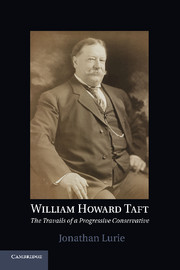9 - Relief and Renewal, 1913–1921
Published online by Cambridge University Press: 05 December 2011
Summary
The Professor
Departing presidents have reflected a variety of sentiments as they left the White House. Andrew Johnson had little to say as he made way for Ulysses S. Grant, the former commander of the Union Army, while Theodore Roosevelt made it clear that he alone had decided not to seek a second full term. His disappointment at surrendering the office he loved, however, was palpable to all who knew him. Taft, on the contrary, welcomed his forced exit with obvious relief. In a perverse way, he considered that by blocking TR from election, he had actually attained a goal far more important than simply retaining his office. Now, the prospect of reemphasizing the dangers of ‘Rooseveltism’ to all who would listen seemed very attractive to him.
And what better forum in which to do this than at Yale University as a professor of law? Taft had frequently emphasized that as a young lawyer in Ohio, he always seemed be in the right place when the jobs were falling all around him. It happened once again early in 1913, when he accepted such an appointment from the university. The position obligated him to give lectures to the Yale undergraduates as well as to law students. Thus Taft foresaw a great opportunity where he could “proclaim the evangel [sic] of constitutionalism and international peace – the two objects that I have been anxious to use the rest of my life so that someday we shall secure that advantage which we lost during my administration.”
- Type
- Chapter
- Information
- William Howard TaftThe Travails of a Progressive Conservative, pp. 174 - 194Publisher: Cambridge University PressPrint publication year: 2011



